- Home
- Amanda Flower
Mums and Mayhem
Mums and Mayhem Read online
Mums and Mayhem
A MAGIC GARDEN MYSTERY
Amanda Flower
In memory of my mother, Rev. Pamela Flower, who taught me the magic of gardens
Acknowledgments
Special thanks to all my dear readers who have traveled with me on this fictional journey to magical Scotland for the Magic Garden series. Because of you, the series has been able to continue. I hope to share more stories about Fiona and her friends in Bellewick with you in the future.
As always, thanks to my amazing agent Nicole Resciniti, who reads all my books, guides my career, and when the going gets really tough sends me cupcakes to keep me on track. I don’t know what I would do without you, Nic.
Thanks too to Matt Martz, Sandra Harding, and the entire team at Crooked Lane Books. Thank you for letting me write a different take on the magical cozies through your publishing house and for creating beautiful books.
Love to my family, Andy, Nicole, Isabella, Andrew, and our two sweet boys. And to David, who feeds me while I’m on deadline and listens to every crazy plot line that bounces into my head. I could not do this without your love and support. Also thanks to my two feline editors, Cheeps and Tummy. My life and my social media would not be the same without you.
Finally, thank you to my father in heaven for gardens, including flowers, bees, and birds that live in them. And thank you for the foxes too.
Where you tend a rose, my lad, a thistle cannot grow.
—Frances Hodgson Burnett, The Secret Garden
Chapter One
Magic wasn’t something in which I believed. It was for fairy tales and myths. At least that’s what I thought until I found out I had inherited a magical garden, part of the estate of Duncreigan on the east coast of Scotland. That’s when I learned I’d been wrong about magic, and a good many other things too.
I was walking through the garden, and everything was in bloom. Even though it was November and there was a bite in the air, the garden flourished. Asters and sunflowers pointed their bright faces toward the sun. Chrysanthemums filled up every corner of the garden, and behind the wide hedgerow in the middle of the garden, the menhir, or standing stone, stood with its yellow rose pointed at the sky.
But as I watched in horror, the yellow rose withered and fell to the ground. The garden shriveled up around me. I started to scream.
I jerked up in bed, wide awake. My long black hair covered my eyes, and I pushed it away. My gray-striped Scottish Fold cat, Ivanhoe, sat at the end of my narrow bed and hissed. My hand was on my chest and my pajamas were soaked with sweat. I flopped back onto my pillow. “It was just a dream. Get a grip, Knox,” I whispered to myself. I noted that my native Tennessee accent was a tad more pronounced because I was out of breath.
Ivanhoe walked the length of my body and stared down at me with the same morbid interest he had when spying a mole in the garden. It wasn’t that comfortable being on the receiving end of his gaze.
“It was only a dream.” This time I said it with far less confidence, because I didn’t know that to be true. In May, when I came to Scotland and learned I’d inherited this cottage and magical garden from my late godfather, I’d begun to receive visions that predicted the future or what the future might be. The visions came in the form of dreams or happened when I touched the standing stone in the middle of the garden.
This might be a dream, but I would have to see the garden to be sure. I grabbed my phone from the nightstand. It was five in the morning. Hours before daylight. I groaned. I would have to check the garden in the dark. I had to go; I would never be able to rest until I knew the garden was all right.
I threw my legs over the side of the bed. I shuffled out of my bedroom with Ivanhoe on my heels. The cottage was a tiny building by any American measure. There was my bedroom that was just big enough for a double bed and a wardrobe, a small bathroom, and the main room that served as my living, dining, and kitchen space. Until a few weeks ago, I had shared the cottage with my younger sister, Isla. She’d graduated from college and, wishing for adventure, followed me to Scotland. She had since moved out of the cottage and into a flat in the village with her new boyfriend. I winced to think of my parents’ reaction when they learned of her living arrangement.
I pulled on my puddle boots, then grabbed my winter coat and stocking cap from the hook by the door and put those on too. While I finished donning my winter clothes, Ivanhoe sat expectantly by the door with his gray-striped tail swishing back and forth on the hardwood floor.
I grabbed a large flashlight from the pantry and shook my head. “No, Ivanhoe, you are not coming with me. It’s dark and cold out. Stay here in the cottage.”
His tail swished faster along the floor, and I could have sworn he understood every word I’d said. It wasn’t too much of a stretch to believe it, I supposed. In for an inch and all that. And seeing as how I believed in magic, wasn’t anything possible, really? Even a cat that understood English? I opened the front door just a crack large enough for me to slip out, but the cat was too quick for me and raced out the door.
“Ivanhoe, get back into the cottage,” I ordered.
He stood a few feet away from me, just out of my reach.
“I mean it,” I said.
The cat turned and started in the direction of the garden. He knew where we were headed. It was the only place we went on these walks.
I sighed and stood in the dim porch light for a moment. The cold wind cut through my coat. I almost turned around and went back into the cottage, but I couldn’t do that. I would not be able to rest until I saw for myself that the garden was safe. I flicked on the flashlight and could see fifty yards in front of me. The light was bright and glaring, and I focused the beam on Ivanhoe’s gray tail. I liked to know where the feline was at all times. The flashlight had been a gift from my boyfriend, Chief Inspector Neil Craig of the County Aberdeen police. At the time, I’d thought it was the most ridiculous flashlight, or torch as he would have called it, I had ever seen. Now, I was happy to have it.
I knew I could call Craig and he would be there as quickly as possible to check the garden for me, but I didn’t want to be the type of woman who couldn’t take care of her own magical responsibilities. And didn’t that sound fanciful? Besides, if something was wrong, I would call Craig. If all was well, it was best not to wake him up; as a police officer, he had so few nights he could sleep through.
I turned up the collar on my coat and made my way over the moor behind the cat. The still-green grass was peppered with smooth boulders that poked just a few inches above the surface. It was important to keep an eye on things as I walked. It would be easy to turn an ankle on one of the smooth rocks or shallow divots beneath my feet.
The walled garden came into view, and the first thing I noticed was the waxy ivy still in place, clinging and all but obstructing the eight-foot wall, creating an impenetrable blanket of green. The heart-shaped leaves shimmered with early-morning dew beneath my light. From outside all seemed well, and I was comforted. Typically the ivy was the first sign something was amiss with the garden; it would lose its leaves and wither. Knowing this, I could have turned back then, but I had come this far, so I figured I should go all the way.
I came up to the place in the wall where I knew the door was from the hundreds of times I had been there before. I slid my hand through the tangle of ivy, found the keyhole, and slipped the old skeleton key inside. The door opened easily, and I went in.
Ivanhoe, who had been patiently waiting at my feet, also went inside.
I let out a breath. The garden was fine. The garden had been fine for the last three hundred years. The asters, sunflowers, and chrysanthemums were all there and in bloom. I stepped deeper into the garden and passed the weeping willow with its b
ranches so long they brushed the ground. I moved around the hedgerow. The yellow rose around the stone bloomed in my flashlight beam. All was well. Why had I thought any different?
At times I didn’t know what to expect from the garden, which I had inherited from my godfather, Uncle Ian, after his death seven months ago. He’d told me very little about my magical inheritance. There were only three rules he’d left me in the letter that Hamish, the garden’s elderly caretaker, delivered to me after I moved to Scotland when I first learned I was the Keeper:
Rule #1: It’s important that you and the garden stay connected.
Rule #2: The garden should be cared for and treated like any other garden.
Rule #3: The menhir and the rose are the heart of the garden and the source of the magic.
I had committed the three rules to memory. I also knew the magic was to be used to help. Each Keeper of the garden over the last three hundred years had been given a gift that he or she was meant to use to help the people of the village of Bellewick, just three miles from Duncreigan. My gift was visions. For other Keepers it had been the ability to heal or tell the future.
The magic had come to be when Uncle Ian’s ancestor, Baird MacCallister, made a deal with the sea after his merchant vessel crashed on the craggy rocks near Duncreigan. As he was pitched into the water, he told the sea that if he was allowed to live, he would stay in Scotland and do good works. The sea spat him up near the menhir and its yellow rose.
When I first heard Baird’s story, I hadn’t believed it. My godfather had never shared the tale with me when he was alive; Hamish told me after Uncle Ian’s death. But slowly over the last few months in Scotland, I had experienced the visions and found it all to be true.
I reached out and touched the stone, wondering if I would see my dream again in a vision, but nothing happened. The dream I’d had was a false alarm. The garden was blooming. It was safe. All was well.
I heard whistling behind me just as the sunrise was beginning to come up over the mountain. “We have much work to do today, Duncan. Lots of pruning.”
I immediately recognized the voice of Hamish MacGregor. Hamish had been the caretaker of Duncreigan when Uncle Ian’s father had been the Keeper of the garden. He came every morning to work in the garden. I didn’t know how I could have taken care of it all without him. Hamish helped with the day-to-day work around the garden, but he didn’t have access to its magic like I did.
Ivanhoe flattened himself in the grass. He had heard Hamish as well.
“No, Ivanhoe,” I said. “Don’t even—”
But before I could finish the sentence, the cat took off around the side of the hedgerow. I followed him just in time to see Duncan, Hamish’s pet red squirrel, throw his paws in the air and squeal in terror. Duncan leaped from Hamish’s shoulder, bolted toward the willow tree, and ran up its trunk before Ivanhoe could reach him.
The gray cat sat at the base of the tree and waited for the squirrel to come back down.
“Miss Fiona!” Hamish said. “You have to do something about that cat!”
I sighed. “I know, Hamish.”
Hamish muttered to himself as he got to work, and behind him I saw the fox with the blue eyes so much like my godfather’s and my own watching me. Ever since Uncle Ian died, the fox had been a constant presence in the garden. Presha Kapoor, my friend from the village, had told me once that the fox was Uncle Ian come back in another form. I wanted to believe that, if only for the comfort it brought me to know Uncle Ian was looking out for the garden and for me. If anyone knew the secrets of the garden, it was him. I inched toward the fox. “Do you know if my dream means anything?” The fox bowed his head, and I felt my unease return.
I pushed back the anxiety rising within me. My nightmare hadn’t been a vision of what was to come. It had just been a dream inspired by lack of sleep and worry over the busy days ahead. That’s what I told myself as I walked back to the cottage. That’s what I chose to believe.
Chapter Two
“The Merchant Society of Bellewick needs to stick together on this.” Bernice Brennan’s cheeks flushed pink as she spoke. She tapped her pencil eraser onto her clipboard in an erratic rhythm. She stood in front of a large stage that was in process of being built in the middle of the main road leading into the village of Bellewick, Scotland. I’d called Bellewick home for the last six months following a series of strange events, including a bad breakup, a sad passing, and the inheritance of my magical garden. Sounds like the beginning of a fairytale, doesn’t it? If I was living in the fairy tale, I hadn’t come to the happily-ever-after part yet. Also, I didn’t remember any once-upon-a-time tales featuring committee meetings. Certainly they would ruin the story. Committee meetings ruined everything, in my opinion.
As Bernice went over the details of the concert for what felt like the hundred and fifteenth time, I found myself only half listening. I was still preoccupied with the terrible dream about my garden from the night before, or, more accurately, very early that morning. Even though I’d verified that the garden was fine, I couldn’t shake an eerie feeling that seemed to hover just above my head.
Doing my best to look like I was paying the utmost attention, I watched the men and women working on the stage. It was like watching black ants build a fortress. All the members of the crew moved in sync. They knew what they were doing, how to do it, and the order it should all happen in, like they had done it thousands of times before. I suspected they had. In Scotland and much of the UK and Europe, Barley McFee was a household name, so of course he would have his own professional stage crew for all his concerts, even a concert held in the tiny village of Bellewick.
As much as I might dislike meetings and committees, when Bernice asked me to join the Merchant Society of Bellewick, I had jumped at the chance. It was the right business move. I had just opened my new flower shop, the Climbing Rose, in the village, and was hungry for an opportunity to become involved in the community. I wanted to be known for something other than being the “American woman living at Duncreigan.” I knew I would never be able to drop the “American woman” moniker, especially with my Nashville drawl, not a common accent in these parts or on the entire island of Great Britain. At the very least, I would be known as the “American woman with the flower shop,” and maybe, just maybe, that title would lead to a sale or two. I would take what I could get.
However, I’d agreed to join before I knew how much work the Merchant Society would be. It was also before Bernice had the idea to throw the biggest event the village had seen in its four- hundred-year history. It was Barley McFee’s Coming Home Concert. Barley was a world-class fiddler who traveled all over the globe to play sold-out stadiums, and he was coming here to Bellewick, with its fewer than two thousand residents, to play a concert in his home village.
The Merchant Society had spent months preparing for the concert. Bernice, who was a jeweler and owned the local jewelry shop, looked at the concert in the same way she looked at the diamonds and gems in her store. She would accept nothing less than perfection, and if she drove everyone in the village mad trying to reach perfection, that was just the breaks.
I would have been more enthused to help if I’d had more time to devote to final preparations. The day of the concert was going to be incredibly busy for me, as I would be handling all the flowers and my parents would be arriving in Scotland from the States soon. Usually I would look forward to such a visit with excitement, but some facts about my birth had recently come to light. During the summer, I’d discovered a box in my godfather’s wardrobe that held photographs and letters hinting that I was Uncle Ian’s biological daughter. Right after the discovery, my mother had confirmed that he was my father in a brief phone call, but ever since she had been reluctant to speak of it. I still didn’t know how Stephen Knox, the man I had known my entire life as my father, was listed on my birth certificate as my father and Uncle Ian was not. I needed answers, but I wasn’t sure my taciturn parents would be willing to give them to me.
/>
Also, if it had been a tad warmer, that would have been a help, too. I knew the concert had to be fit into the musician’s schedule, but was it really a good idea to have a fiddle concert outside, in Scotland, in November? The threat of rain was always heavy in the air this time of year, and then there was even the chance of a late-autumn storm rolling over the little coastal village. No one wanted to be outside in a storm like that.
I shivered and burrowed down in my winter coat a little bit more. I was the only member of the Merchant Society wearing a heavy coat. The rest of them were perfectly comfortable in cardigans and light jackets.
Presha Kapoor, my closest friend in the village, a sixty-something Indian woman, was wrapped in a shawl. Being from India, she should have been as cold as I was, but after forty years in Bellewick, her body must have adjusted to the cold. As of yet, mine hadn’t. My thin Tennessee blood wasn’t up for the chill in the air. I wore jeans, calf-high boots, a flannel shirt, and a winter coat, and I was still cold. I wished I had thought to wear a winter hat, too. Early November in Scotland was like the middle of January in Nashville.
“Fiona! Fiona Knox, are you paying attention? What is happening with the flowers?” Bernice shoved her glasses onto the top of her head, and her short hair sprang up in all directions. I didn’t know her well, but I would say the woman was close to the end of her rope. She might have thought hosting this concert was a grand idea four months ago when planning began, but with it less than twenty-four hours away, she was questioning that judgment.
Presha elbowed me in the ribs.
“Oh yes, the flowers,” I said, and pulled my gaze away from the black-clad crew on the stage. “We’re all set. The chrysanthemums are being delivered today, and we’ll have them in place later this afternoon. They will be at their very best for the concert.”

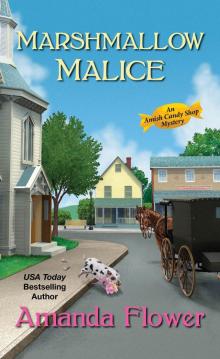 Marshmallow Malice
Marshmallow Malice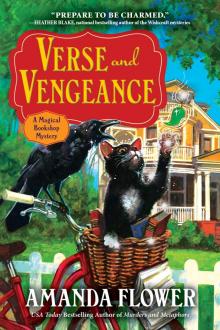 Verse and Vengeance
Verse and Vengeance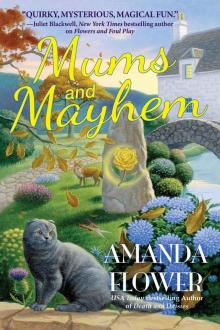 Mums and Mayhem
Mums and Mayhem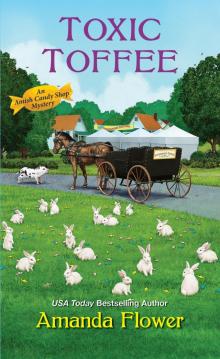 Toxic Toffee
Toxic Toffee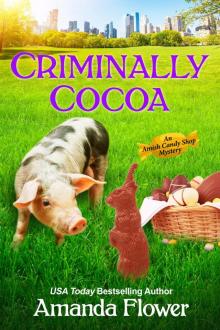 Criminally Cocoa
Criminally Cocoa Assaulted Caramel
Assaulted Caramel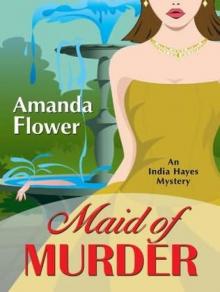 Maid of Murder aihm-1
Maid of Murder aihm-1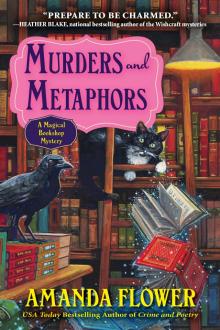 Murders and Metaphors
Murders and Metaphors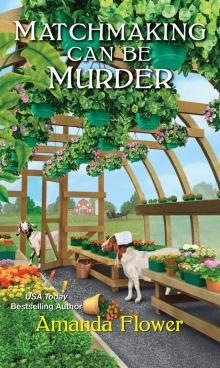 Matchmaking Can Be Murder
Matchmaking Can Be Murder Maid of Murder (An India Hayes Mystery)
Maid of Murder (An India Hayes Mystery)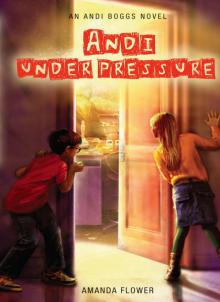 Andi Under Pressure
Andi Under Pressure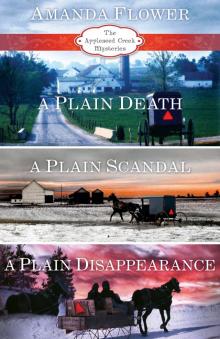 Appleseed Creek Trilogy, Books 1-3
Appleseed Creek Trilogy, Books 1-3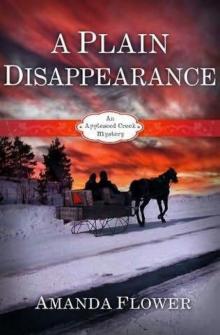 A Plain Disappearance
A Plain Disappearance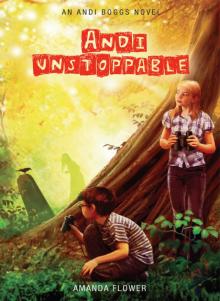 Andi Unstoppable
Andi Unstoppable The Final Vow
The Final Vow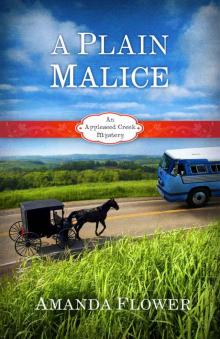 A Plain Malice: An Appleseed Creek Mystery (Appleseed Creek Mystery Series Book 4)
A Plain Malice: An Appleseed Creek Mystery (Appleseed Creek Mystery Series Book 4)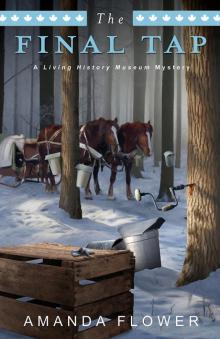 The Final Tap
The Final Tap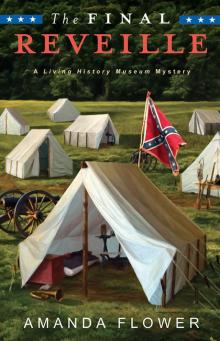 The Final Reveille: A Living History Museum Mystery
The Final Reveille: A Living History Museum Mystery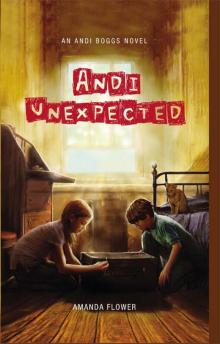 Andi Unexpected
Andi Unexpected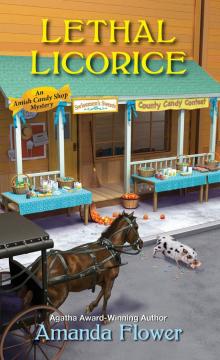 Lethal Licorice
Lethal Licorice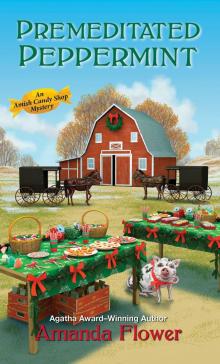 Premeditated Peppermint
Premeditated Peppermint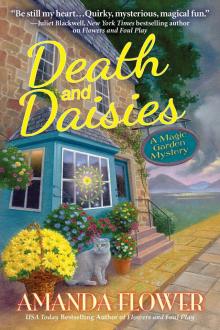 Death and Daisies
Death and Daisies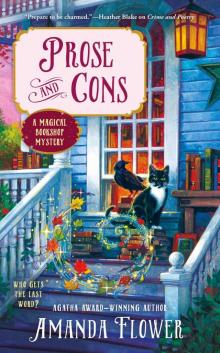 Prose and Cons
Prose and Cons